2013届高考英语二轮复习精品课件:高频语法复习8
文档属性
| 名称 | 2013届高考英语二轮复习精品课件:高频语法复习8 | 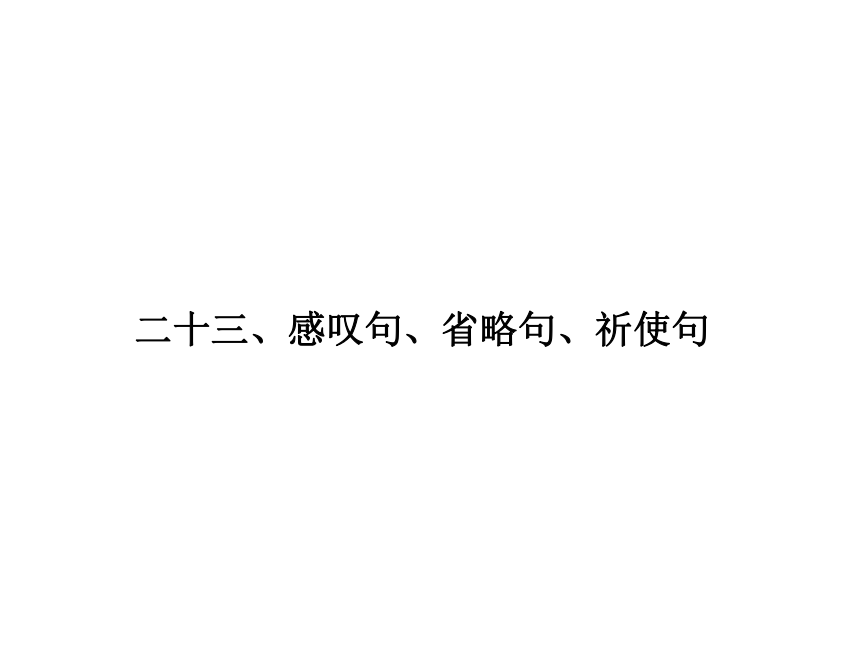 | |
| 格式 | zip | ||
| 文件大小 | 1021.2KB | ||
| 资源类型 | 教案 | ||
| 版本资源 | |||
| 科目 | 英语 | ||
| 更新时间 | 2012-09-11 22:12:49 | ||
图片预览

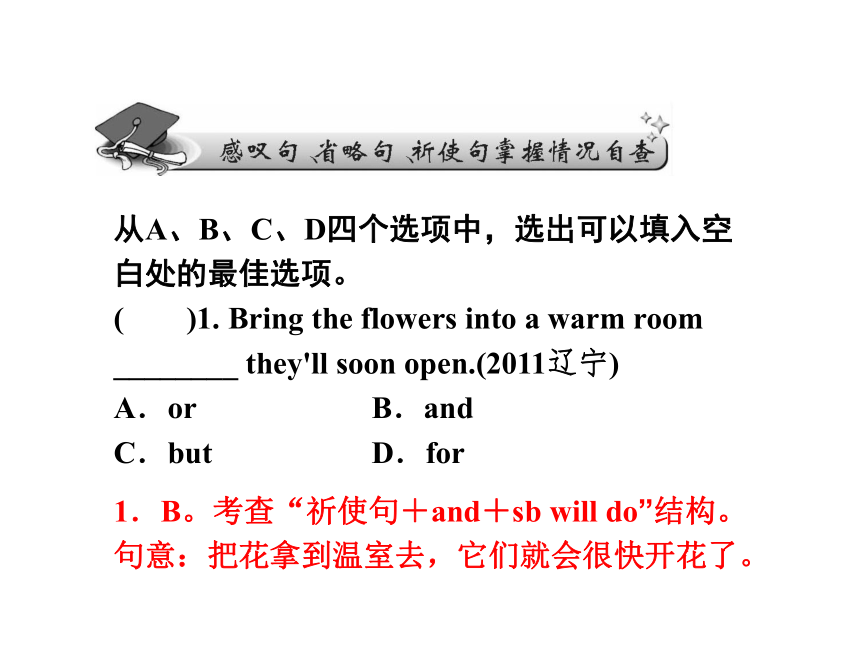
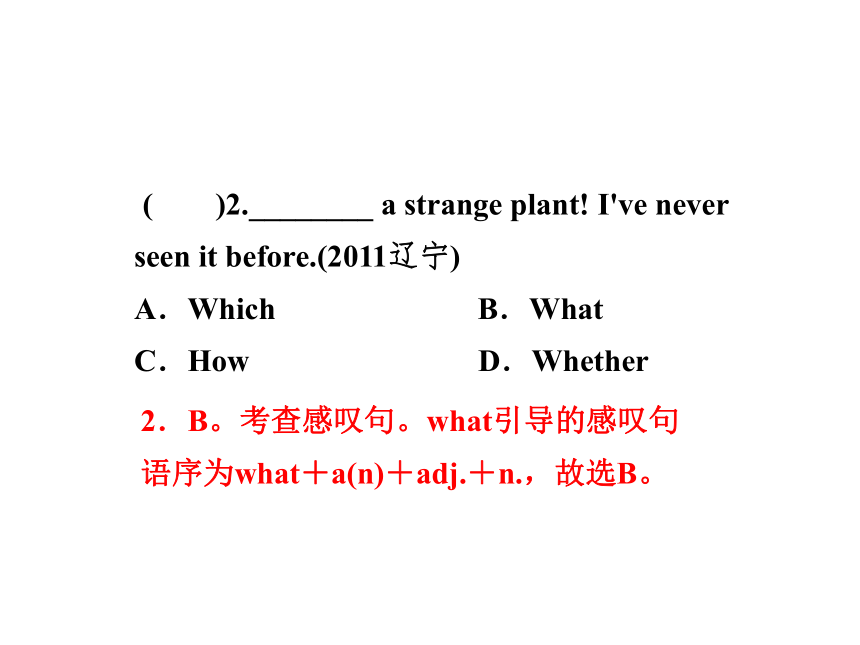
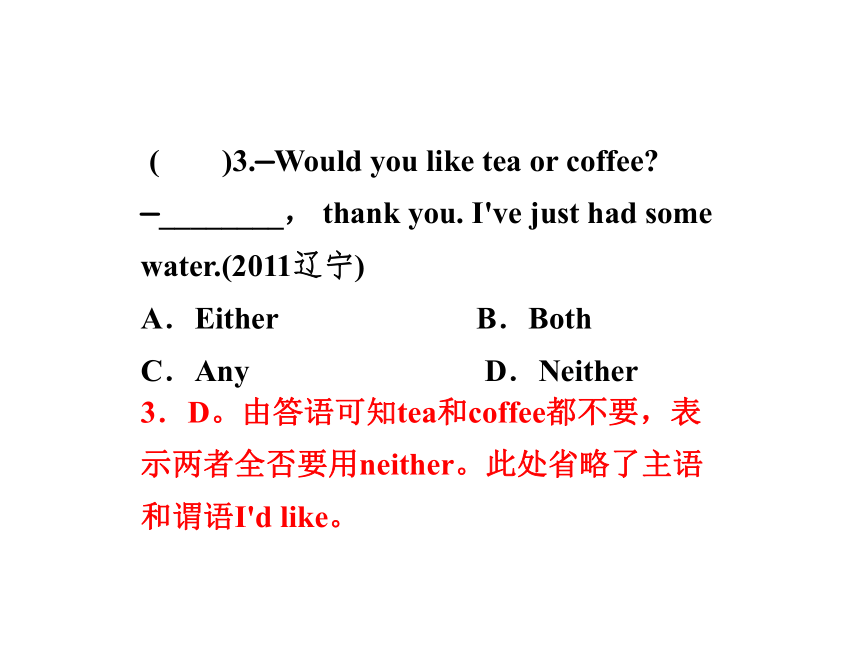
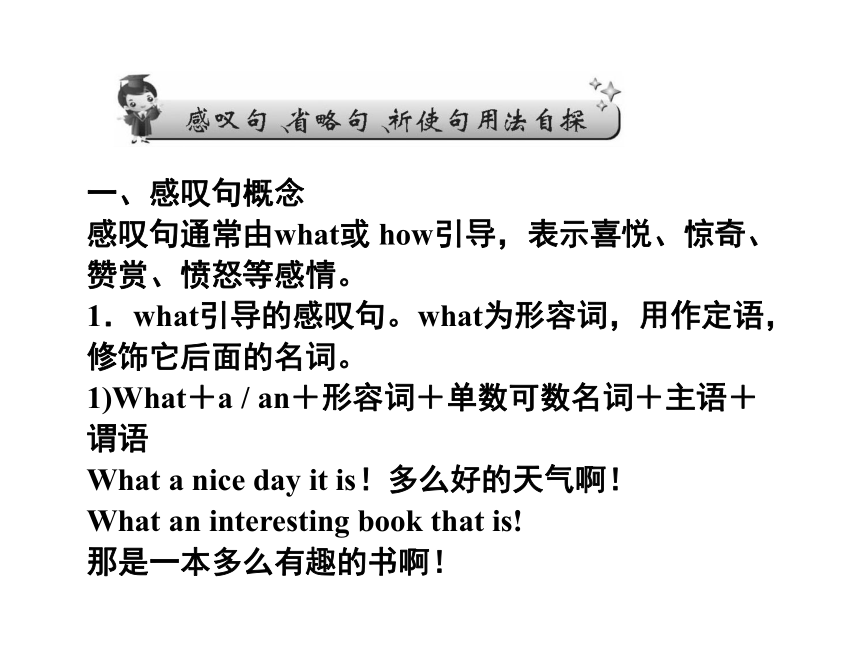
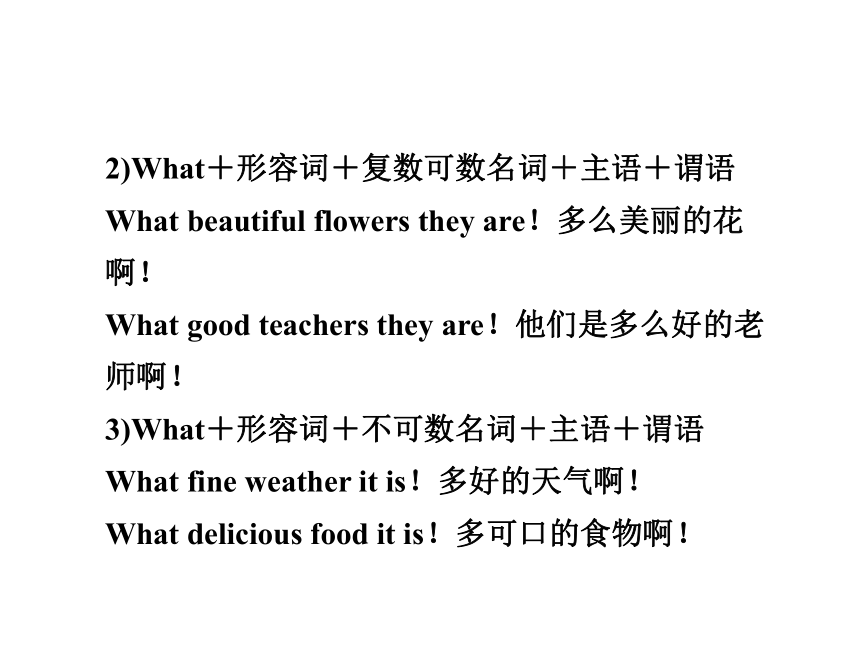
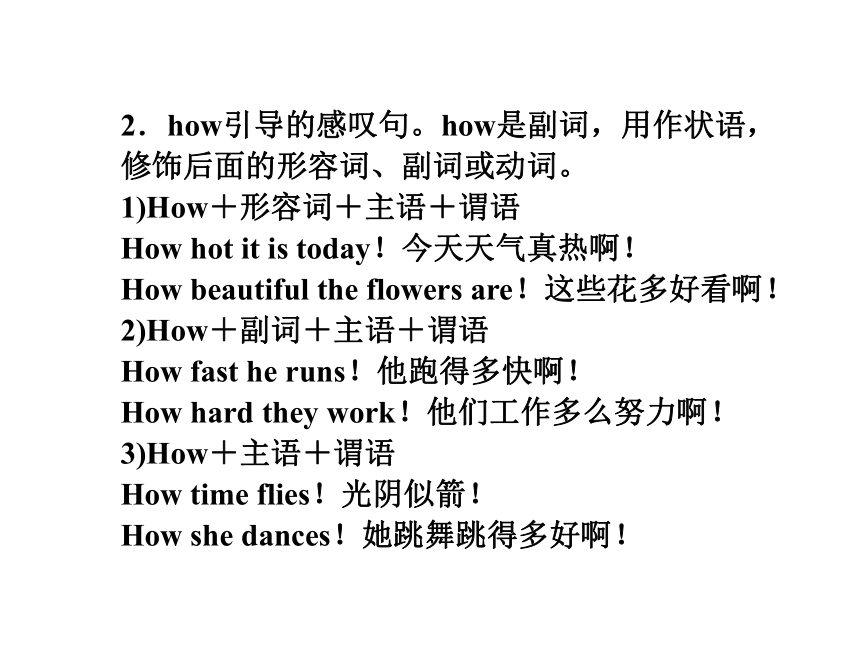
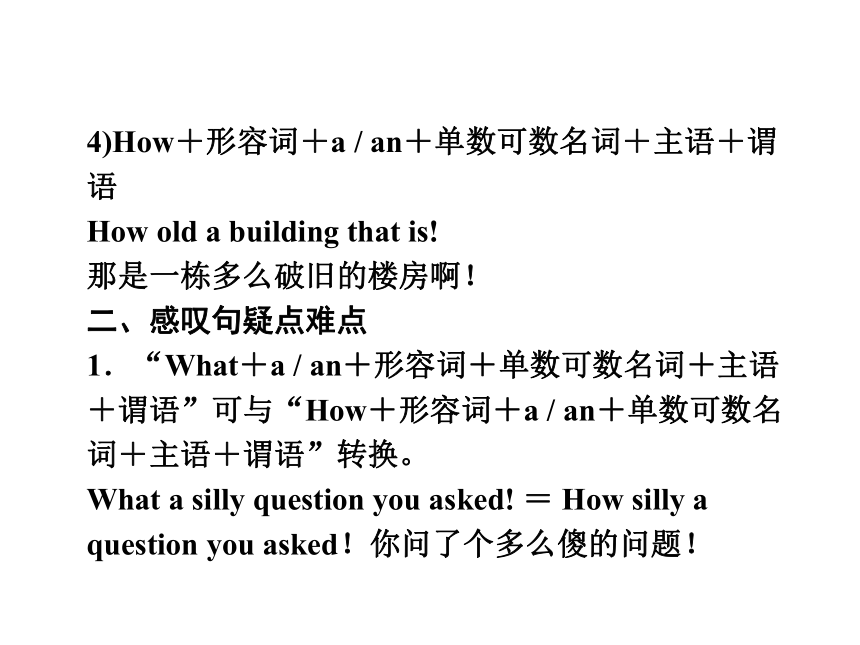
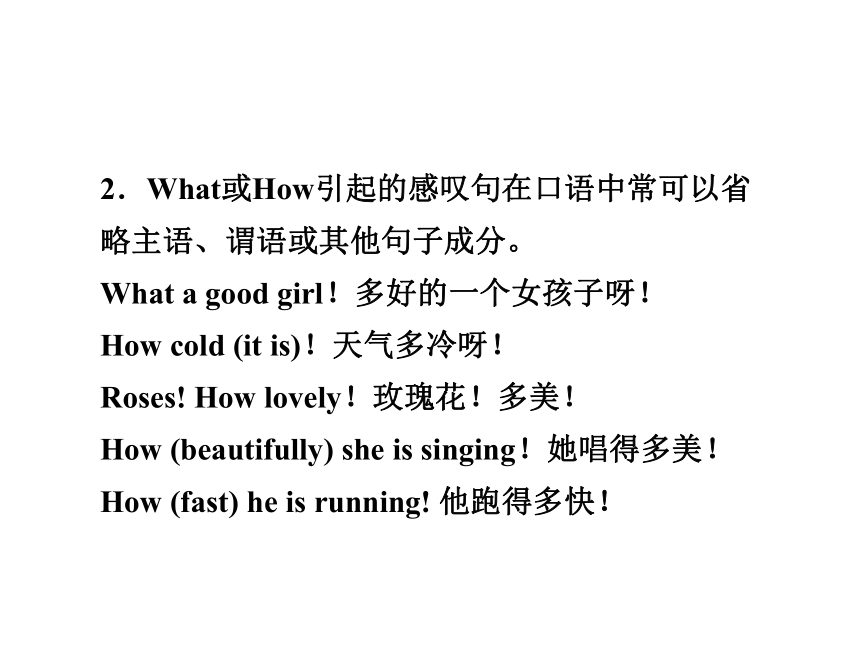
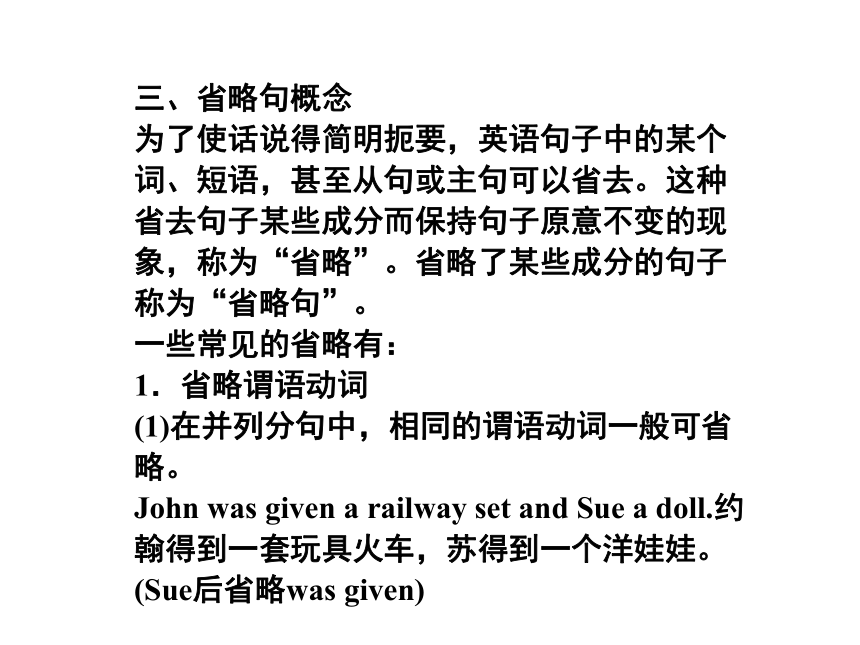
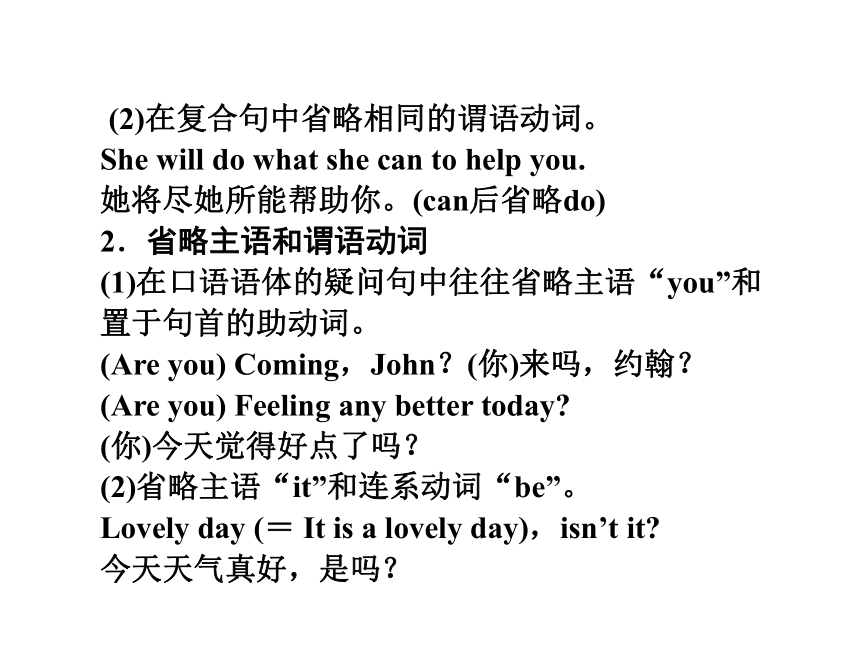
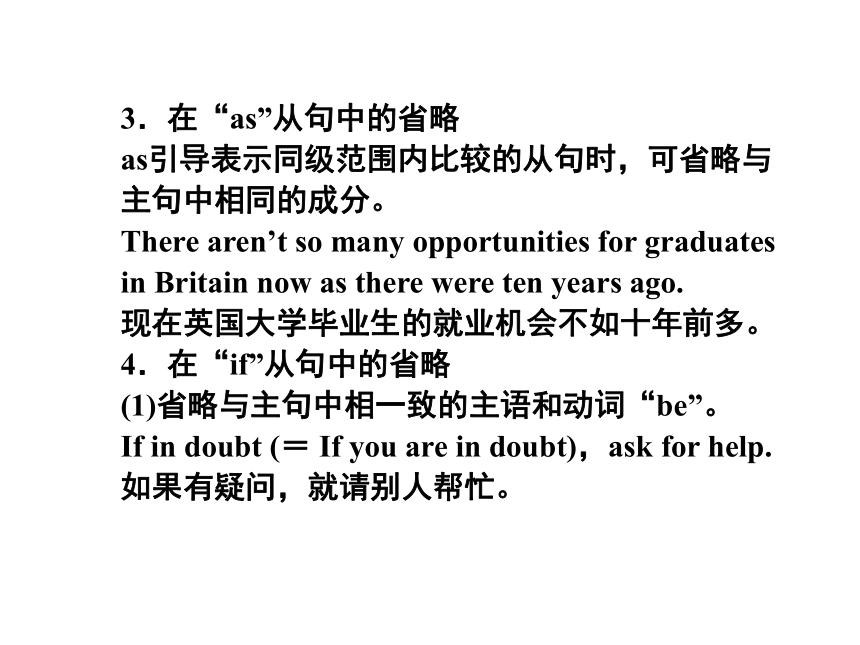
文档简介
(共54张PPT)
二十三、感叹句、省略句、祈使句
从A、B、C、D四个选项中,选出可以填入空白处的最佳选项。
( )1. Bring the flowers into a warm room ________ they'll soon open.(2011辽宁)
A.or B.and
C.but D.for
1.B。考查“祈使句+and+sb will do”结构。句意:把花拿到温室去,它们就会很快开花了。
( )2.________ a strange plant! I've never seen it before.(2011辽宁)
A.Which B.What
C.How D.Whether
2.B。考查感叹句。what引导的感叹句语序为what+a(n)+adj.+n.,故选B。
( )3.—Would you like tea or coffee
—________, thank you. I've just had some water.(2011辽宁)
A.Either B.Both
C.Any D.Neither
3.D。由答语可知tea和coffee都不要,表示两者全否要用neither。此处省略了主语和谓语I'd like。
一、感叹句概念
感叹句通常由what或 how引导,表示喜悦、惊奇、赞赏、愤怒等感情。
1.what引导的感叹句。what为形容词,用作定语,修饰它后面的名词。
1)What+a / an+形容词+单数可数名词+主语+谓语
What a nice day it is!多么好的天气啊!
What an interesting book that is!
那是一本多么有趣的书啊!
2)What+形容词+复数可数名词+主语+谓语
What beautiful flowers they are!多么美丽的花啊!
What good teachers they are!他们是多么好的老师啊!
3)What+形容词+不可数名词+主语+谓语
What fine weather it is!多好的天气啊!
What delicious food it is!多可口的食物啊!
2.how引导的感叹句。how是副词,用作状语,修饰后面的形容词、副词或动词。
1)How+形容词+主语+谓语
How hot it is today!今天天气真热啊!
How beautiful the flowers are!这些花多好看啊!
2)How+副词+主语+谓语
How fast he runs!他跑得多快啊!
How hard they work!他们工作多么努力啊!
3)How+主语+谓语
How time flies!光阴似箭!
How she dances!她跳舞跳得多好啊!
4)How+形容词+a / an+单数可数名词+主语+谓语
How old a building that is!
那是一栋多么破旧的楼房啊!
二、感叹句疑点难点
1.“What+a / an+形容词+单数可数名词+主语+谓语”可与“How+形容词+a / an+单数可数名词+主语+谓语”转换。
What a silly question you asked! = How silly a question you asked!你问了个多么傻的问题!
2.What或How引起的感叹句在口语中常可以省略主语、谓语或其他句子成分。
What a good girl!多好的一个女孩子呀!
How cold (it is)!天气多冷呀!
Roses! How lovely!玫瑰花!多美!
How (beautifully) she is singing!她唱得多美!
How (fast) he is running! 他跑得多快!
三、省略句概念
为了使话说得简明扼要,英语句子中的某个词、短语,甚至从句或主句可以省去。这种省去句子某些成分而保持句子原意不变的现象,称为“省略”。省略了某些成分的句子称为“省略句”。
一些常见的省略有:
1.省略谓语动词
(1)在并列分句中,相同的谓语动词一般可省略。
John was given a railway set and Sue a doll.约翰得到一套玩具火车,苏得到一个洋娃娃。(Sue后省略was given)
(2)在复合句中省略相同的谓语动词。
She will do what she can to help you.
她将尽她所能帮助你。(can后省略do)
2.省略主语和谓语动词
(1)在口语语体的疑问句中往往省略主语“you”和置于句首的助动词。
(Are you) Coming,John?(你)来吗,约翰?
(Are you) Feeling any better today
(你)今天觉得好点了吗?
(2)省略主语“it”和连系动词“be”。
Lovely day (= It is a lovely day),isn’t it
今天天气真好,是吗?
3.在“as”从句中的省略
as引导表示同级范围内比较的从句时,可省略与主句中相同的成分。
There aren’t so many opportunities for graduates in Britain now as there were ten years ago.
现在英国大学毕业生的就业机会不如十年前多。
4.在“if”从句中的省略
(1)省略与主句中相一致的主语和动词“be”。
If in doubt (= If you are in doubt),ask for help.
如果有疑问,就请别人帮忙。
但在“if necessary”“if possible”中省略的主语不是主句中的主语,而是表示主句中内容的“it”。如:
I will do the work if possible.(= if it is possible)
如果可能的话,我会干这工作。
(2)在“if any”中,可以看成是省略了“there”和动词“be”。
He wondered what answer,if any (= if there was any),he would give us.
如果要给答复的话,他不知道给我们什么答复好。
类似的表达还有“if ever”,强调频度。如:
He is seldom,if ever,absent from school.
他简直从不缺课。
(3)在虚拟语气中,可省略if,将助动词置于句首。
Were you in my position (= If you were in my position),you would do the same.
假如你在我的位置,你也会这样做。
I would go,should it be necessary (= if it should be necessary).
假如有必要,我会去的。
Had I time (If I had time),I would come.
假如我有时间,我会来的。
5.动词不定式的省略
(1)用“to”代替整个动词不定式或不定式短语。
— Let’s go for a walk.咱们去散步吧。
— I don’t want to.我不想去。
(2)在would like, love, hate, prefer,want,mean等后面通常不能省略to。
— Are you interested in going to university
上大学你感兴趣吗?
— I’d like to.我愿意上大学。(不能说:I’d like)
My parents encouraged me to study art,but I didn’t want to.我的父母鼓励我学习艺术,但是我不愿意。(不能说:I didn’t want)
但如果前面用了某些连词,如when,if,what,as等,want 后面的to往往省略,like后面的to几乎总是省略。
Come when you want (to).你愿意来的时候就来吧。
I’ll do what I like.我喜欢干什么就干什么。
Stay as long as you like.你愿意待多久就待多久吧。
四、省略句疑点难点
1.不定式符号to的省略与保留
(1)在had better,would rather,why(not) 等结构后的不定式符号to必须省略。
You’d better tell her the truth.你最好告诉她真相。
I would rather go home on foot tomorrow.
明天我想步行回家。
Why not give her some flowers
干嘛不送给她一些花呢?
(2)不定式作介词but,except,besides的宾语,且介词之前有行为动词do或它的其他形式时,不定式符号to被省略。
She did nothing but complain the whole time she was here.
她在这儿时一个劲地抱怨个没完。
What do you like to do besides swim
除了游泳,你还喜欢干什么?
(3)两个或多个不定式短语表示有并列关系时,后面不定式的不定式符号to通常被省略;如果是对比关系,则不定式符号to通常要保留。
She told the child to stay there and wait till she came back.
她让孩子待在那里等她回来。(并列关系)
They didn’t tell me whether to go on or to stop.
他们没有告诉我是继续下去还是停止。(对比关系)
(4)在某些感官动词或使役动词如hear,listen to,make,notice,observe,see,watch等之后充当宾补的不定式中,不定式符号to总是被省略,但在被动语态中,不定式符号to要保留。
They made that man work all the morning.
他们让那个人干了一个上午。
That man was made to work all the morning.
那个人被要求干了一个上午。
(5)不定式短语作表语,不定式符号to常常要保留,但如果前面含有动词do或do的其他形式时,作表语的不定式可以保留也可以省略不定式符号to。
The greatest happiness is to work for the happiness of all.
最大的幸福就是为大家的幸福而工作。
The only thing I can do now is (to) go on by myself.
我现在能做的只有靠自己继续进行下去。
2.祈使句前使用主语,以加强语气。
用以表示请求、命令、劝告、建议等的句子叫祈使句,句首用动词原形,否定形式在前加Don’t。祈使句的主语一般为第二人称you,并常常省略。但是有以下两种特殊情况。
(1)有时为了强调,祈使句前也可不省略主语you,这时you总是重读,以加强语气。
You do it right away.你给我马上就做。
You be quiet!你给我安静点!
Don’t you open the door.你可不要把门打开。
(2)还有一种祈使句,主语用第三人称,这种主语也应该重读,以加强语气。
Everybody stand up please.大家请站起来。
Parents with children go to the front.
带孩子的家长到前面去。
五、祈使句概念
祈使句用来表示请求、命令、建议、叮嘱、劝告或邀请等。常见的有下面一些类型:
1.含有第二人称主语(you)的祈使句
含有第二人称主语(you)的祈使句中的主语通常省略,肯定式中使用动词原形,否定式为“Don’t+动词原形”,强调式为“Do+动词原形”。
Go back to your seat.回到你的座位上去。
Be sure to get there before nine.
一定要在9点前到达那儿。
Don’t be foolish, boy.别犯傻了,孩子。
Do wait a moment.务必等一等。
2.Let为引导词的祈使句
1)Let’s...表示建议和对方一起做某事;Let us...通常表示请对方允许做某事。
Let’s spend a day in the country.
咱们到乡下去过一天吧。
Let us help you.让我们来帮助你吧。
Let’s...和Let us...的否定形式一般为Let’s / Let us not +动词原形,也可以说成Don’t let’s .../ Don’t let us...。如:
Let’s / Let us not stay too late.
我们不要待太晚了。
Don’t let’s invite George to the party; he’s such a bore.
我们不要邀请乔治来参加晚会,他太令人厌烦了。
2)第三人称也可以用于let为引导词的祈使句。如:
Let him be here by ten o’clock.让他十点前来这里。
否定形式为Don’t let...。如:
Don’t let him disturb us.不要让他打扰我们。
3.无动词祈使句
No passage! 禁止通行!
Hands up! 举起手来!
No parking.禁止停车。
No smoking! 禁止吸烟!
No fishing! 禁止钓鱼!
This way, please.请走这边。
六、祈使句疑点难点
1.带主语的祈使句
祈使句中的主语通常省略,但有时为了加强语气,或面对不止一人时要指明向谁发出指令,可在动词前加上主语。应注意这时仍是一个祈使句,故不论人称,动词均用原形。
You take that seat.你坐那个座位。
You mind your own business! 不关你什么事!
Somebody answer the phone please.请来个人接电话。
Nobody move!谁都别动!
否定式“Don’t+动词原形”中也可以在动词前加上主语。如:
Don’t you forget it.你可不要忘了这事。
Don’t anyone open the door.谁也不许开门。
2.用and连接祈使句中两个并列的动词
祈使句中两个并列的动词用and连接,不用不定式符号to。如:
Come and see this goldfish.
来看这条金鱼。(不说Come to see...)
Go and buy yourself a new pair of shoes.
去给自己买双鞋吧。(不说Go to buy...)
在美式英语中,go后面可直接跟动词原形。如:
Go buy yourself a new pair of shoes.
3.祈使句+and / or引导的并列句
此句型表示“条件与结果”并存,其中的祈使句可转换为if条件句。
Work hard and you will succeed.= If you work hard, you will succeed.
Hurry up, or you will miss the last bus.= If you don’t hurry up, you will miss the last bus.
Put on your coat or you’ll catch a cold.It’s cool outside.
外面凉快。穿上外套,否则你会感冒的。
注意:有时前面的祈使句可简化成一个名词短语。如:
A bit more effort and you will succeed.= Make a bit more effort and you will succeed.
从A、B、C、D四个选项中,选出可以填入空白处的最佳选项。
( )1.________ with farmers in the country in your summer vacation, and you will learn a lot about farming.
A.Work B.Working
C.To work D.Having worked
1.A。有些考生会认为前面是非谓语动词短语作状语,于是误选B、C或D。其实,前后两句之间有and连接,说明前面应该是一个独立的句子,因此正确答案为A,构成祈使句。
( )2.Start out right away, ________ you'll miss the first train.
A.and B.but
C.or D.while
2.C。本题是对“祈使句+or+陈述句”的考查。由于本题横线前后的两句之间为转折关系,故选项A可以首先被排除。选项B和D的含义和用法用在本题中也不合适。选项C中的or意为“否则”或“不然的话”,符合题意。
( )3.—I'm sorry to tell you that you made a mistake in your test.
—How can that be I did it ________ in class.
A.as told B.as am told
C.as telling D.as I told
3.A。做此题时,有些考生会马上想到as引导的定语从句,从而误选B。其实,此空格处是方式状语从句的省略,正确答案为A。
( )4.After a close talk with the teacher, Tom has become a better student than ________.
A.that used to be B.he used to
C.he was used to D.he used to be
4.D。本题是对英语中动词不定式省略的考查。考生易错选B,认为只保留到不定式符号to即可。分析句子结构可知,used to be 表示“过去……”;当动词不定式中有be动词或have时,要对其进行保留;而在其他情况下保留到不定式符号to 即可。
( )5.—What should I do with this passage
—________ the main idea of each paragraph.
A.Finding out B.Found out
C.Find out D.To find out
5.C。本题考查省略回答。此题极易误选A,考生会认为是动名词短语作do的宾语。其实我们把该选项代入题目,便发现不符合题意。此题应选C,完整的句子应为:You should find out the main idea of each paragraph.句意:——我应该怎么处理这篇文章?——(你应该)弄清楚每段的中心思想。
( )6.—Who's made so much noise in the garden
—________ the children.
A.There are B.They are
C.That is D.It is
6.D。考查强调句型的省略。根据本题问句的结构,“Who”是主语,“has made”是谓语,可以断定答句中的“the children”是用来作句子的主语的,即:The children have made so much noise in the garden.答语用强调结构来强调主语the children。完整的答句为:It is the children who have made so much noise in the garden.其他选项均属“答非所问”。
( )7.He speaks English well indeed, but of course not ________ a native speaker.
A.as fluent as B.more fluent than
C.so fluently as D.much fluently than
7.C。本题后半句为省略句,补全后为but of course he can't speak ________ a native speaker。由此判断此处应该用副词来修饰speak,从而排除A、B两项;D项的结构明显不对。
( )8.Has she done her week's washing ________, I'll ask her to see a film tonight.
A.If so B.If not
C.If any D.If anything
8.A。句意:她已经完成了这周的清洗了吗?如果完成了的话,我想邀请她今晚去看电影。if so要表达的完整意思是“if she has done her week's washing”。
( )9.________ to do the work, I should do it some other day.
A.If were I B.I were
C.Were I D.Was I
9.C。此处Were I是虚拟语气的条件句,表示与将来事实相反的情况,相当于“If I were”。此处省略了If, were应提前。
( )10.—What you said at the party hurt me deeply.
—Sorry, but ________.
A.I didn't mean it B.I didn't mean to
C.I don't mean it D.I don't mean to
10.B。根据上句可知此处指过去的情况,故用过去时。I didn't mean to.为I didn't mean to hurt you.的省略形式。
二十三、感叹句、省略句、祈使句
Directions:For each of the following unfinished sentences there are four choices marked A,B,C and D. Choose the one that best completes the sentence.
( )1.Find ways to praise your children often, ________ you'll find they will open their hearts to you.
A.till B.or
C.and D.but
1.C。分析题干结构可知,句中前半部分是祈使句,后面是陈述句,联系语境可知,此处是“祈使句+and+陈述句”结构,故选C项。
( )2.—English has a large vocabulary, doesn't it
—Yes. ________ more words and expressions and you will find it easier to read and communicate.
A.Know B.Knowing
C.To know D.Known
2.A。答语部分的意思是:掌握更多的词汇和表达,你就会发现阅读和交流更容易了。该部分句型结构为:祈使句+and+陈述句,故正确答案为A。
( )3.________ for us to surf on the sea in summer!
A.What exciting it is
B.How exciting is it
C.What exciting is it
D.How exciting it is
3.D。在感叹句的用法中,what通常修饰名词,而how通常修饰形容词或副词。此处是“How+形容词+主语+谓语”型的感叹句,故D项为正确答案。
( )4.—Will you go to the party
—Of course I will ________.
A.if invited
B.if having invited
C.if I was invited
D.if I will be invited
4.A。将句子补充完整:Of course I will go to the party if I am invited.很明显,主句中与上一句重复的内容及条件状语从句中的主语和be动词被省略了。
( )5.—What's the matter with Della
—Well, her parents wouldn't allow her to go to the party, but she still ________.
A.hopes to B.hopes so
C.hopes not D.hopes for
5.A。本题考查动词不定式的省略。她父母不允许她去参加晚会,但是她仍然希望去参加。将句子补充完整为“..., but she still hopes to go to the party”,很明显,此处保留了动词不定式符号to。
( )6.—Will you go home tomorrow evening
—No, I'm going to a lecture, or at least I am planning ________.
A.so B.to
C.it D.that
6.B。考查动词不定式的省略,完整的回答为:No, I'm going to a lecture, or at least I am planning to go to the lecture.
( )7.Francis, ________ born in Kentucky, lived and practised as a lawyer in Missouri.
A.was B.he was
C.although D.who he was
7.C。although之后省略了主语和be动词,可还原为:Francis, although he was born in Kentucky, lived and practised as a lawyer in Missouri.
( )8.________ different life today is from ________ it was fifty years ago!
A.What a;what B.How;what
C.What;what D.What a;how
8.B。题干是一个感叹句,第一个空格处所填词应该是修饰different的,故第一空应填How。题干的陈述句语序应是“Life today is different from ________ it was fifty years ago!”由此可知,第二空应填what,what在句中引导宾语从句,且在从句中作表语。
( )9.________ surprising it is you should not know what has happened!
A.What B.How
C.That D.It
9.B。句意:你竟然不知道发生的一切,真是太令人吃惊了。由于空格后面的surprising是形容词,所以用how。
( )10.Elizabeth believed the dog would die if ________ to her cruel owner so she kept it.
A.returning
B.was returned
C.it would return
D.returned
10.D。考查状语从句的省略。句意:Elizabeth认为如果把这条狗还给它的残暴的主人的话会死掉,所以她把它留了下来。if后面省略了the dog was,再由句意可知,后加returned构成被动语态。
( )11. I hear Mary was teaching English in a middle school at this time of last year and she still ______.
A. does B. did
C. was D. is
11.D。这是一个省略句,还原是:she still is teaching English in a middle school。
( )12.He left without a word as if ________.
A.never to return
B.never returning
C.he had never returned
D.he would never returning
12.A。考查状态从句的省略。as if后省略了he was。
( )13.________ and we'll finish the work ahead of time.
A.An hour earlier
B.If we start an hour earlier
C.Staring an hour earlier
D.Started an hour earlier
13.A。考查句式。句意:早一个小时,我们就会提前完成工作。祈使句+and sb / sth will...是固定句式,该句式中的祈使句有时可换为名词短语。
( )14.—Who should be responsible for the accident
—The boss, not the workers. They just carry the orders ________.
A.as told B.as are told
C.as telling D.as they told
14.A。考查省略。答语句意:是老板而不是工人负责任。工人们只是奉命行事。as后省略了they are,所以接told。
( )15.________ U2, the Irish rock band from Dublin, perform a concert in Beijing, tell me in advance.
A.If B.Shall
C.Should D.Would
15.C。should意思是“万一”,表示可能性,通常用于条件句中。如果省略掉if,通常把should提前。此句可还原成If U2, the Irish rock band from Dublin, should perform...。
二十三、感叹句、省略句、祈使句
从A、B、C、D四个选项中,选出可以填入空白处的最佳选项。
( )1. Bring the flowers into a warm room ________ they'll soon open.(2011辽宁)
A.or B.and
C.but D.for
1.B。考查“祈使句+and+sb will do”结构。句意:把花拿到温室去,它们就会很快开花了。
( )2.________ a strange plant! I've never seen it before.(2011辽宁)
A.Which B.What
C.How D.Whether
2.B。考查感叹句。what引导的感叹句语序为what+a(n)+adj.+n.,故选B。
( )3.—Would you like tea or coffee
—________, thank you. I've just had some water.(2011辽宁)
A.Either B.Both
C.Any D.Neither
3.D。由答语可知tea和coffee都不要,表示两者全否要用neither。此处省略了主语和谓语I'd like。
一、感叹句概念
感叹句通常由what或 how引导,表示喜悦、惊奇、赞赏、愤怒等感情。
1.what引导的感叹句。what为形容词,用作定语,修饰它后面的名词。
1)What+a / an+形容词+单数可数名词+主语+谓语
What a nice day it is!多么好的天气啊!
What an interesting book that is!
那是一本多么有趣的书啊!
2)What+形容词+复数可数名词+主语+谓语
What beautiful flowers they are!多么美丽的花啊!
What good teachers they are!他们是多么好的老师啊!
3)What+形容词+不可数名词+主语+谓语
What fine weather it is!多好的天气啊!
What delicious food it is!多可口的食物啊!
2.how引导的感叹句。how是副词,用作状语,修饰后面的形容词、副词或动词。
1)How+形容词+主语+谓语
How hot it is today!今天天气真热啊!
How beautiful the flowers are!这些花多好看啊!
2)How+副词+主语+谓语
How fast he runs!他跑得多快啊!
How hard they work!他们工作多么努力啊!
3)How+主语+谓语
How time flies!光阴似箭!
How she dances!她跳舞跳得多好啊!
4)How+形容词+a / an+单数可数名词+主语+谓语
How old a building that is!
那是一栋多么破旧的楼房啊!
二、感叹句疑点难点
1.“What+a / an+形容词+单数可数名词+主语+谓语”可与“How+形容词+a / an+单数可数名词+主语+谓语”转换。
What a silly question you asked! = How silly a question you asked!你问了个多么傻的问题!
2.What或How引起的感叹句在口语中常可以省略主语、谓语或其他句子成分。
What a good girl!多好的一个女孩子呀!
How cold (it is)!天气多冷呀!
Roses! How lovely!玫瑰花!多美!
How (beautifully) she is singing!她唱得多美!
How (fast) he is running! 他跑得多快!
三、省略句概念
为了使话说得简明扼要,英语句子中的某个词、短语,甚至从句或主句可以省去。这种省去句子某些成分而保持句子原意不变的现象,称为“省略”。省略了某些成分的句子称为“省略句”。
一些常见的省略有:
1.省略谓语动词
(1)在并列分句中,相同的谓语动词一般可省略。
John was given a railway set and Sue a doll.约翰得到一套玩具火车,苏得到一个洋娃娃。(Sue后省略was given)
(2)在复合句中省略相同的谓语动词。
She will do what she can to help you.
她将尽她所能帮助你。(can后省略do)
2.省略主语和谓语动词
(1)在口语语体的疑问句中往往省略主语“you”和置于句首的助动词。
(Are you) Coming,John?(你)来吗,约翰?
(Are you) Feeling any better today
(你)今天觉得好点了吗?
(2)省略主语“it”和连系动词“be”。
Lovely day (= It is a lovely day),isn’t it
今天天气真好,是吗?
3.在“as”从句中的省略
as引导表示同级范围内比较的从句时,可省略与主句中相同的成分。
There aren’t so many opportunities for graduates in Britain now as there were ten years ago.
现在英国大学毕业生的就业机会不如十年前多。
4.在“if”从句中的省略
(1)省略与主句中相一致的主语和动词“be”。
If in doubt (= If you are in doubt),ask for help.
如果有疑问,就请别人帮忙。
但在“if necessary”“if possible”中省略的主语不是主句中的主语,而是表示主句中内容的“it”。如:
I will do the work if possible.(= if it is possible)
如果可能的话,我会干这工作。
(2)在“if any”中,可以看成是省略了“there”和动词“be”。
He wondered what answer,if any (= if there was any),he would give us.
如果要给答复的话,他不知道给我们什么答复好。
类似的表达还有“if ever”,强调频度。如:
He is seldom,if ever,absent from school.
他简直从不缺课。
(3)在虚拟语气中,可省略if,将助动词置于句首。
Were you in my position (= If you were in my position),you would do the same.
假如你在我的位置,你也会这样做。
I would go,should it be necessary (= if it should be necessary).
假如有必要,我会去的。
Had I time (If I had time),I would come.
假如我有时间,我会来的。
5.动词不定式的省略
(1)用“to”代替整个动词不定式或不定式短语。
— Let’s go for a walk.咱们去散步吧。
— I don’t want to.我不想去。
(2)在would like, love, hate, prefer,want,mean等后面通常不能省略to。
— Are you interested in going to university
上大学你感兴趣吗?
— I’d like to.我愿意上大学。(不能说:I’d like)
My parents encouraged me to study art,but I didn’t want to.我的父母鼓励我学习艺术,但是我不愿意。(不能说:I didn’t want)
但如果前面用了某些连词,如when,if,what,as等,want 后面的to往往省略,like后面的to几乎总是省略。
Come when you want (to).你愿意来的时候就来吧。
I’ll do what I like.我喜欢干什么就干什么。
Stay as long as you like.你愿意待多久就待多久吧。
四、省略句疑点难点
1.不定式符号to的省略与保留
(1)在had better,would rather,why(not) 等结构后的不定式符号to必须省略。
You’d better tell her the truth.你最好告诉她真相。
I would rather go home on foot tomorrow.
明天我想步行回家。
Why not give her some flowers
干嘛不送给她一些花呢?
(2)不定式作介词but,except,besides的宾语,且介词之前有行为动词do或它的其他形式时,不定式符号to被省略。
She did nothing but complain the whole time she was here.
她在这儿时一个劲地抱怨个没完。
What do you like to do besides swim
除了游泳,你还喜欢干什么?
(3)两个或多个不定式短语表示有并列关系时,后面不定式的不定式符号to通常被省略;如果是对比关系,则不定式符号to通常要保留。
She told the child to stay there and wait till she came back.
她让孩子待在那里等她回来。(并列关系)
They didn’t tell me whether to go on or to stop.
他们没有告诉我是继续下去还是停止。(对比关系)
(4)在某些感官动词或使役动词如hear,listen to,make,notice,observe,see,watch等之后充当宾补的不定式中,不定式符号to总是被省略,但在被动语态中,不定式符号to要保留。
They made that man work all the morning.
他们让那个人干了一个上午。
That man was made to work all the morning.
那个人被要求干了一个上午。
(5)不定式短语作表语,不定式符号to常常要保留,但如果前面含有动词do或do的其他形式时,作表语的不定式可以保留也可以省略不定式符号to。
The greatest happiness is to work for the happiness of all.
最大的幸福就是为大家的幸福而工作。
The only thing I can do now is (to) go on by myself.
我现在能做的只有靠自己继续进行下去。
2.祈使句前使用主语,以加强语气。
用以表示请求、命令、劝告、建议等的句子叫祈使句,句首用动词原形,否定形式在前加Don’t。祈使句的主语一般为第二人称you,并常常省略。但是有以下两种特殊情况。
(1)有时为了强调,祈使句前也可不省略主语you,这时you总是重读,以加强语气。
You do it right away.你给我马上就做。
You be quiet!你给我安静点!
Don’t you open the door.你可不要把门打开。
(2)还有一种祈使句,主语用第三人称,这种主语也应该重读,以加强语气。
Everybody stand up please.大家请站起来。
Parents with children go to the front.
带孩子的家长到前面去。
五、祈使句概念
祈使句用来表示请求、命令、建议、叮嘱、劝告或邀请等。常见的有下面一些类型:
1.含有第二人称主语(you)的祈使句
含有第二人称主语(you)的祈使句中的主语通常省略,肯定式中使用动词原形,否定式为“Don’t+动词原形”,强调式为“Do+动词原形”。
Go back to your seat.回到你的座位上去。
Be sure to get there before nine.
一定要在9点前到达那儿。
Don’t be foolish, boy.别犯傻了,孩子。
Do wait a moment.务必等一等。
2.Let为引导词的祈使句
1)Let’s...表示建议和对方一起做某事;Let us...通常表示请对方允许做某事。
Let’s spend a day in the country.
咱们到乡下去过一天吧。
Let us help you.让我们来帮助你吧。
Let’s...和Let us...的否定形式一般为Let’s / Let us not +动词原形,也可以说成Don’t let’s .../ Don’t let us...。如:
Let’s / Let us not stay too late.
我们不要待太晚了。
Don’t let’s invite George to the party; he’s such a bore.
我们不要邀请乔治来参加晚会,他太令人厌烦了。
2)第三人称也可以用于let为引导词的祈使句。如:
Let him be here by ten o’clock.让他十点前来这里。
否定形式为Don’t let...。如:
Don’t let him disturb us.不要让他打扰我们。
3.无动词祈使句
No passage! 禁止通行!
Hands up! 举起手来!
No parking.禁止停车。
No smoking! 禁止吸烟!
No fishing! 禁止钓鱼!
This way, please.请走这边。
六、祈使句疑点难点
1.带主语的祈使句
祈使句中的主语通常省略,但有时为了加强语气,或面对不止一人时要指明向谁发出指令,可在动词前加上主语。应注意这时仍是一个祈使句,故不论人称,动词均用原形。
You take that seat.你坐那个座位。
You mind your own business! 不关你什么事!
Somebody answer the phone please.请来个人接电话。
Nobody move!谁都别动!
否定式“Don’t+动词原形”中也可以在动词前加上主语。如:
Don’t you forget it.你可不要忘了这事。
Don’t anyone open the door.谁也不许开门。
2.用and连接祈使句中两个并列的动词
祈使句中两个并列的动词用and连接,不用不定式符号to。如:
Come and see this goldfish.
来看这条金鱼。(不说Come to see...)
Go and buy yourself a new pair of shoes.
去给自己买双鞋吧。(不说Go to buy...)
在美式英语中,go后面可直接跟动词原形。如:
Go buy yourself a new pair of shoes.
3.祈使句+and / or引导的并列句
此句型表示“条件与结果”并存,其中的祈使句可转换为if条件句。
Work hard and you will succeed.= If you work hard, you will succeed.
Hurry up, or you will miss the last bus.= If you don’t hurry up, you will miss the last bus.
Put on your coat or you’ll catch a cold.It’s cool outside.
外面凉快。穿上外套,否则你会感冒的。
注意:有时前面的祈使句可简化成一个名词短语。如:
A bit more effort and you will succeed.= Make a bit more effort and you will succeed.
从A、B、C、D四个选项中,选出可以填入空白处的最佳选项。
( )1.________ with farmers in the country in your summer vacation, and you will learn a lot about farming.
A.Work B.Working
C.To work D.Having worked
1.A。有些考生会认为前面是非谓语动词短语作状语,于是误选B、C或D。其实,前后两句之间有and连接,说明前面应该是一个独立的句子,因此正确答案为A,构成祈使句。
( )2.Start out right away, ________ you'll miss the first train.
A.and B.but
C.or D.while
2.C。本题是对“祈使句+or+陈述句”的考查。由于本题横线前后的两句之间为转折关系,故选项A可以首先被排除。选项B和D的含义和用法用在本题中也不合适。选项C中的or意为“否则”或“不然的话”,符合题意。
( )3.—I'm sorry to tell you that you made a mistake in your test.
—How can that be I did it ________ in class.
A.as told B.as am told
C.as telling D.as I told
3.A。做此题时,有些考生会马上想到as引导的定语从句,从而误选B。其实,此空格处是方式状语从句的省略,正确答案为A。
( )4.After a close talk with the teacher, Tom has become a better student than ________.
A.that used to be B.he used to
C.he was used to D.he used to be
4.D。本题是对英语中动词不定式省略的考查。考生易错选B,认为只保留到不定式符号to即可。分析句子结构可知,used to be 表示“过去……”;当动词不定式中有be动词或have时,要对其进行保留;而在其他情况下保留到不定式符号to 即可。
( )5.—What should I do with this passage
—________ the main idea of each paragraph.
A.Finding out B.Found out
C.Find out D.To find out
5.C。本题考查省略回答。此题极易误选A,考生会认为是动名词短语作do的宾语。其实我们把该选项代入题目,便发现不符合题意。此题应选C,完整的句子应为:You should find out the main idea of each paragraph.句意:——我应该怎么处理这篇文章?——(你应该)弄清楚每段的中心思想。
( )6.—Who's made so much noise in the garden
—________ the children.
A.There are B.They are
C.That is D.It is
6.D。考查强调句型的省略。根据本题问句的结构,“Who”是主语,“has made”是谓语,可以断定答句中的“the children”是用来作句子的主语的,即:The children have made so much noise in the garden.答语用强调结构来强调主语the children。完整的答句为:It is the children who have made so much noise in the garden.其他选项均属“答非所问”。
( )7.He speaks English well indeed, but of course not ________ a native speaker.
A.as fluent as B.more fluent than
C.so fluently as D.much fluently than
7.C。本题后半句为省略句,补全后为but of course he can't speak ________ a native speaker。由此判断此处应该用副词来修饰speak,从而排除A、B两项;D项的结构明显不对。
( )8.Has she done her week's washing ________, I'll ask her to see a film tonight.
A.If so B.If not
C.If any D.If anything
8.A。句意:她已经完成了这周的清洗了吗?如果完成了的话,我想邀请她今晚去看电影。if so要表达的完整意思是“if she has done her week's washing”。
( )9.________ to do the work, I should do it some other day.
A.If were I B.I were
C.Were I D.Was I
9.C。此处Were I是虚拟语气的条件句,表示与将来事实相反的情况,相当于“If I were”。此处省略了If, were应提前。
( )10.—What you said at the party hurt me deeply.
—Sorry, but ________.
A.I didn't mean it B.I didn't mean to
C.I don't mean it D.I don't mean to
10.B。根据上句可知此处指过去的情况,故用过去时。I didn't mean to.为I didn't mean to hurt you.的省略形式。
二十三、感叹句、省略句、祈使句
Directions:For each of the following unfinished sentences there are four choices marked A,B,C and D. Choose the one that best completes the sentence.
( )1.Find ways to praise your children often, ________ you'll find they will open their hearts to you.
A.till B.or
C.and D.but
1.C。分析题干结构可知,句中前半部分是祈使句,后面是陈述句,联系语境可知,此处是“祈使句+and+陈述句”结构,故选C项。
( )2.—English has a large vocabulary, doesn't it
—Yes. ________ more words and expressions and you will find it easier to read and communicate.
A.Know B.Knowing
C.To know D.Known
2.A。答语部分的意思是:掌握更多的词汇和表达,你就会发现阅读和交流更容易了。该部分句型结构为:祈使句+and+陈述句,故正确答案为A。
( )3.________ for us to surf on the sea in summer!
A.What exciting it is
B.How exciting is it
C.What exciting is it
D.How exciting it is
3.D。在感叹句的用法中,what通常修饰名词,而how通常修饰形容词或副词。此处是“How+形容词+主语+谓语”型的感叹句,故D项为正确答案。
( )4.—Will you go to the party
—Of course I will ________.
A.if invited
B.if having invited
C.if I was invited
D.if I will be invited
4.A。将句子补充完整:Of course I will go to the party if I am invited.很明显,主句中与上一句重复的内容及条件状语从句中的主语和be动词被省略了。
( )5.—What's the matter with Della
—Well, her parents wouldn't allow her to go to the party, but she still ________.
A.hopes to B.hopes so
C.hopes not D.hopes for
5.A。本题考查动词不定式的省略。她父母不允许她去参加晚会,但是她仍然希望去参加。将句子补充完整为“..., but she still hopes to go to the party”,很明显,此处保留了动词不定式符号to。
( )6.—Will you go home tomorrow evening
—No, I'm going to a lecture, or at least I am planning ________.
A.so B.to
C.it D.that
6.B。考查动词不定式的省略,完整的回答为:No, I'm going to a lecture, or at least I am planning to go to the lecture.
( )7.Francis, ________ born in Kentucky, lived and practised as a lawyer in Missouri.
A.was B.he was
C.although D.who he was
7.C。although之后省略了主语和be动词,可还原为:Francis, although he was born in Kentucky, lived and practised as a lawyer in Missouri.
( )8.________ different life today is from ________ it was fifty years ago!
A.What a;what B.How;what
C.What;what D.What a;how
8.B。题干是一个感叹句,第一个空格处所填词应该是修饰different的,故第一空应填How。题干的陈述句语序应是“Life today is different from ________ it was fifty years ago!”由此可知,第二空应填what,what在句中引导宾语从句,且在从句中作表语。
( )9.________ surprising it is you should not know what has happened!
A.What B.How
C.That D.It
9.B。句意:你竟然不知道发生的一切,真是太令人吃惊了。由于空格后面的surprising是形容词,所以用how。
( )10.Elizabeth believed the dog would die if ________ to her cruel owner so she kept it.
A.returning
B.was returned
C.it would return
D.returned
10.D。考查状语从句的省略。句意:Elizabeth认为如果把这条狗还给它的残暴的主人的话会死掉,所以她把它留了下来。if后面省略了the dog was,再由句意可知,后加returned构成被动语态。
( )11. I hear Mary was teaching English in a middle school at this time of last year and she still ______.
A. does B. did
C. was D. is
11.D。这是一个省略句,还原是:she still is teaching English in a middle school。
( )12.He left without a word as if ________.
A.never to return
B.never returning
C.he had never returned
D.he would never returning
12.A。考查状态从句的省略。as if后省略了he was。
( )13.________ and we'll finish the work ahead of time.
A.An hour earlier
B.If we start an hour earlier
C.Staring an hour earlier
D.Started an hour earlier
13.A。考查句式。句意:早一个小时,我们就会提前完成工作。祈使句+and sb / sth will...是固定句式,该句式中的祈使句有时可换为名词短语。
( )14.—Who should be responsible for the accident
—The boss, not the workers. They just carry the orders ________.
A.as told B.as are told
C.as telling D.as they told
14.A。考查省略。答语句意:是老板而不是工人负责任。工人们只是奉命行事。as后省略了they are,所以接told。
( )15.________ U2, the Irish rock band from Dublin, perform a concert in Beijing, tell me in advance.
A.If B.Shall
C.Should D.Would
15.C。should意思是“万一”,表示可能性,通常用于条件句中。如果省略掉if,通常把should提前。此句可还原成If U2, the Irish rock band from Dublin, should perform...。
